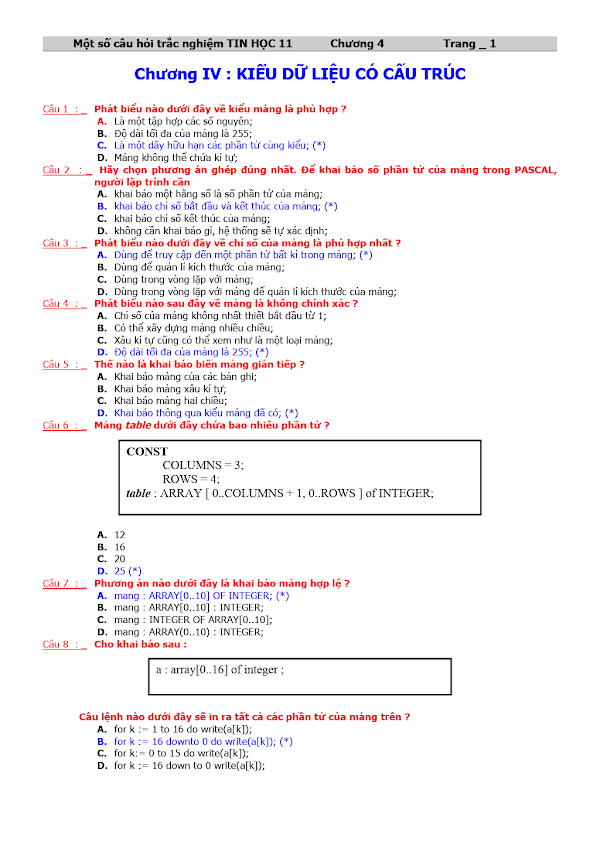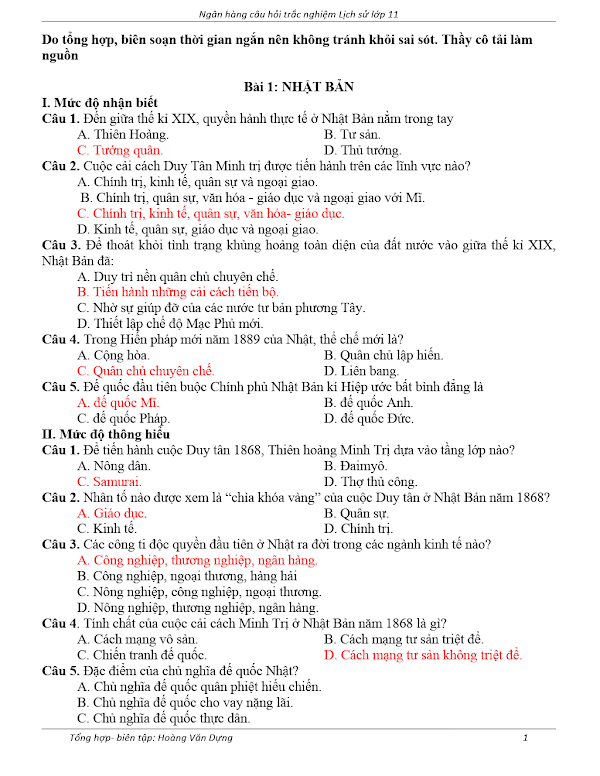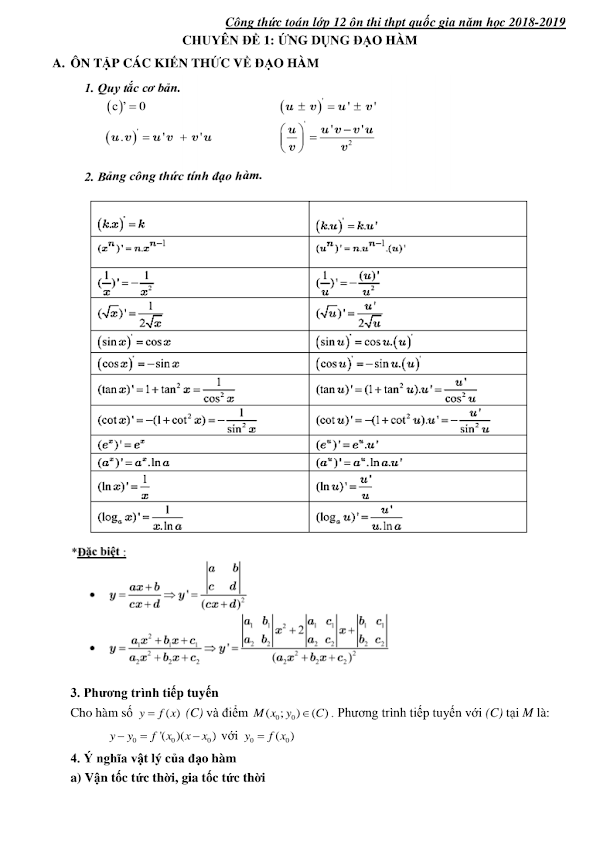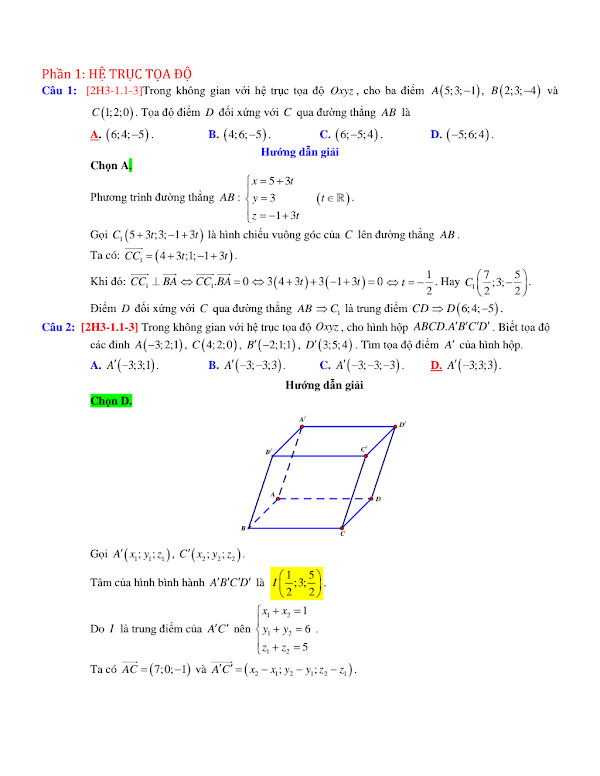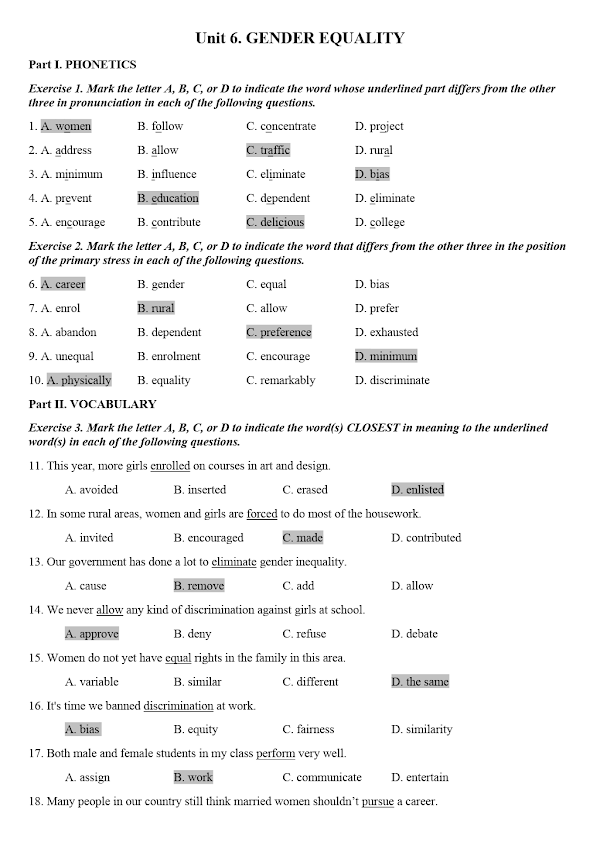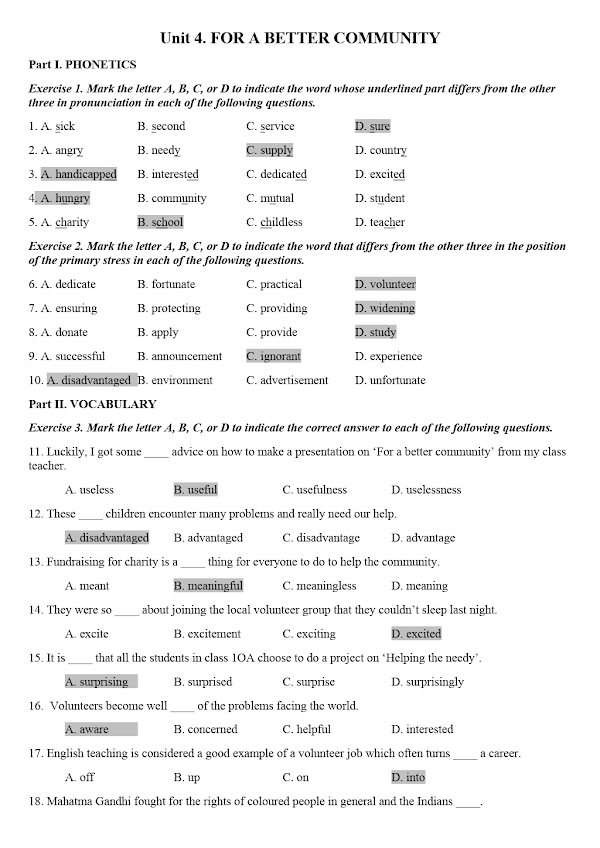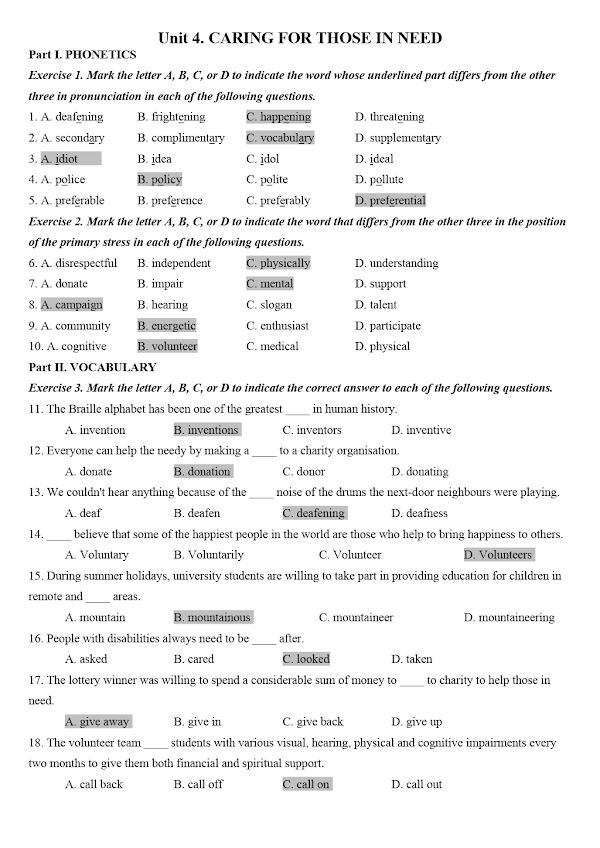Đề thi tham khảo kì thi THPTQG năm 2019 môn Tiếng Anh (có đáp án và lời giải chi tiết)
Chào các bạn học sinh và quý thầy cô, hôm nay LogaVN gửi tới bạn đọc tài liệu "Đề thi tham khảo kì thi THPTQG năm 2019 môn Tiếng Anh (có đáp án và lời giải chi tiết)". Hi vọng sẽ giúp ích cho các bạn học tập và giảng dạy.
KỲ THI TRUNG HỌC PHỔ THÔNG QUỐC GIA NĂM 2019
Bài thi: NGOẠI NGỮ; Môn thi: TIẾNG ANH
(Đề thi có 05 trang)
Thời gian làm bài: 60 phút, không kể thời gian phát đề
Mark the letter A, B, C, or D on your answer sheet to indicate the word whose underlined part differs from the other three in pronunciation in each of the following questions.
Question 1: A. washed B. formed C. turned D. boiled
Question 2: A. house B. mouth C. could D. found
Mark the letter A, B, C, or D on your answer sheet to indicate the word that differs from the other three in the position of primary stress in each of the following questions.
Question 3: A. inform B. explore C.prevent D.cancel
Question 4: A. attitude B. manager C.invention D.company
Mark the letter A, B, C, or D on your answer sheet to indicate the correct answer to each of the following questions.
Question 5: My parents hope to travel around world next summer.
A. a B. an C. the D. Ø (no article)
Question 6: If you watch this film, you about the cultures of Southeast Asian countries.
A. learned B. were learning C. will learn D. would learn
Question 7: Paul noticed a job advertisement while he along the street.
A. was walking B. would walk C. walked D. had walked
Question 8: Solar energy is not widely used it is friendly to the environment.
A. since B. although C. in spite of D. because of
Question 9: The sign warns people the dangers of swimming in this river.
A. about B. from C. with D. to
Question 10: , they were surprised to find their favourite band playing there.
A. On arrival at the party B. To have attended the party
C. They had arrived at the party D. Just attended
Mã đề thi 001
BỘ GD&ĐTKỲ THI TRUNG HỌC PHỔ THÔNG QUỐC GIA NĂM 2019ĐỀ THI THAM KHẢOBài thi: NGOẠI NGỮ; Môn thi: TIẾNG ANH(Đề thi có 05 trang)Thời gian làm bài: 60 phút, không kể thời gian phát đề
Họ, tên thí sinh: .....................................................................
Số báo danh: ..........................................................................Mã đề thi 001
Mark the letter A, B, C, or D on your answer sheet to indicate the word whose underlined part differs from the other three in pronunciation in each of the following questions.
Question 1: A. washed B. formed C. turned D. boiled
Question 2: A. house B. mouth C. could D. found
Mark the letter A, B, C, or D on your answer sheet to indicate the word that differs from the other three in the position of primary stress in each of the following questions.
Question 3: A. inform B. explore C.prevent D.cancel
Question 4: A. attitude B. manager C.invention D.company
Mark the letter A, B, C, or D on your answer sheet to indicate the correct answer to each of the following questions.
Question 5: My parents hope to travel around world next summer.
A. a B. an C. the D. Ø (no article)
Question 6: If you watch this film, you about the cultures of Southeast Asian countries.
A. learned B. were learning C. will learn D. would learn
Question 7: Paul noticed a job advertisement while he along the street.
A. was walking B. would walk C. walked D. had walked
Question 8: Solar energy is not widely used it is friendly to the environment.
A. since B. although C. in spite of D. because of
Question 9: The sign warns people the dangers of swimming in this river.
A. about B. from C. with D. to
Question 10: , they were surprised to find their favourite band playing there.
A. On arrival at the party B. To have attended the party
C. They had arrived at the party D. Just attended the party
Question 11: Once in large quantities, these products will be more affordably priced.
A. are produced B. having produced C. produced D. producing
Question 12: Jane would never forget first prize in such a prestigious competition.
A. to be awarded B. being awarded C. to have awarded D. having awarded
Question 13: You should turn off the lights before going out to save .
A. electricity B. electrify C. electric D. electrically
Question 14: school fees may discourage many students from attending university.
A. Gaining B. Receiving C. Improving D. Raising
Question 15: Drinking too much alcohol is said to harm to our health.
A. make B. do C. lead D. take
Question 16: At the end of the training course, each participant was presented with a
of completion.
A. degree B. certificate
C. diploma D. qualification
Question 17: The high levels of pollution in the coastal areas are a matter of great concern to the government.
A. redundantly B. intensively C. marginally D. excessively
Question 18: Event organisers should plan everything carefully so as to leave nothing to .
A. possibility B. mistake C. opportunity D. chance
Mark the letter A, B, C, or D on your answer sheet to indicate the word(s) CLOSEST in meaning to the underlined word(s) in each of the following questions.
Question 19: The discovery of the new planet was regarded as a major breakthrough
in astronomy.
A. promised B. doubted C. considered D. refused
Question 20: Mary has finally managed to get round her strict parents to let her go
on a three- day excursion with her classmates.
A. permit B. persuade C. offer D. support
Mark the letter A, B, C, or D on your answer sheet to indicate the word(s) OPPOSITE in meaning to the underlined word(s) in each of the following questions.
Question 21: Traffic congestion in big cities deters many people from using
their private cars at peak hours.
A. prohibits B. protects C. encourages D. limits
Question 22: These days, many people only read printed newspapers
once in a while as they tend to access information online.
A. regularly B. attentively C. occasionally D. selectively
Mark the letter A, B, C, or D on your answer sheet to indicate the option that
best completes each of the following exchanges.
Question 23: Jack is inviting Mary to his party.
Jack: ''Would you like to come to my party this weekend?''
- Mary: '' .''
A. Yes, I'd love to B. No, don't worry C. You're welcome D. I'm afraid so
Question 24: Laura and Mitchell are talking about their school curriculum.
Laura: ''I think Art should be a compulsory subject.''
Mitchell: '' . Art helps develop creativity.''
A. I quite agree B. You must be kidding
C. I'm of the opposite opinion D. I don't think that's a good idea
Read the following passage and mark the letter A, B, C, or D on your answer sheet to indicate the correct word or phrase that best fits each of the numbered blanks from 25 to 29.
Advances in mobile technology and social networking websites mean we spend more time online than ever before. If Facebook were a country, it would be the third largest in the world by population (The Economist, 2010). It is (25) not surprising that so many psychologists, sociologists, and others are eager to give their thoughts on how this is impacting negatively on our society.
The biggest criticism levelled at social networking is that young people are losing their offline friends to online friends (26) are unable to provide the same deep connection and emotional support. However, a lot of research shows these criticisms are generally (27) . Allen et al. (2010) discovered that it is socially adjusted adolescents who are more likely to have a networking profile than those who are not. One study by the Pew Internet and American Life Project (2009) found that people are not (28) offline friends with online companions but are using them to support their offline relationships. The study also found that social networks allow us to have discussions with a much more diverse set of people than in the real world, so we share knowledge with people from a wide (29) _________of backgrounds.
(Adapted from ''Skillful Reading & Writing 4''by Mike Boyle and Lindsay Warwick)
Question 25: A. whileB. howeverC. despiteD. thereforeQuestion 26: A. whatB. whoC. whichD. whomQuestion 27: A. uninvolvedB. unequalledC. unsettledD. unfoundedQuestion 28: A. makingB. providingC. combiningD. substitutingQuestion 29: A. varyB. varietyC. variousD. variously
Read the following passage and mark the letter A, B, C, or D on your answer sheet to indicate the correct answer to each of the questions from 30 to 34. Visitors to London are struck by the proud splendour and glamour of one of the world'soldest capitals, admiring iconic sites like Big Ben, the Palace of Westminster and Buckingham Palace. However, visitors seeking a glimpse into the city's everyday life should not miss Portobello Market, which is the most-visited market in London. This vibrant market has been featured in a number of films, documentaries and bestselling books, the most famous being the film ''Notting Hill'' starring Hugh Grant and Julia Roberts, which brought Portobello Market to the attention of audiences all over the world. Portobello Market is divided into different sections selling second-hand items, clothing,jewellery, souvenirs and vegetables. The most sought-after area is devoted to antiques. Visitors may feel overwhelmed as there are over 1,000 booths manned by antique dealers from throughout England. It's a great fun to browse through antique cameras, watches, pottery and paintings that date back 300 years. They are sold at different prices, so it's possible to find a few good bargains. It seems that both buyers and sellers look forward to the weekends when they can meet and escape the city's fast pace at Portobello Market. When tired from exploring the market, visitors can drop into the nearby food courts tosavour an Indian curry, Italian pizza or sandwiches from Europe. It's a great pleasure to drink a cappuccino while listening to street performers. These represent the lively fun of PortobelloMarket, offering exciting experiences that keep people coming back.
(Adapted from ''Heritage'' - Vietnam Airlines in-flight magazine)
Question 30: What is the passage mainly about?
A. The film ''Notting Hill'' B. The city of LondonC. Portobello Market D. European cuisine
Question 31: According to the passage, Portobello Market has been featured in all of the
following EXCEPT ______.A. films B. documentaries C. books D. songs
Question 32: The word ''they'' in paragraph 3 refers to ______.A. prices B. bargains C. buyers and sellers D. weekends
Question 33: Visitors to the antique area may feel overwhelmed because ______.A. they can meet all sorts of people from EnglandB. all the antiques are sold at the same priceC. there are a large number of antique shops thereD. all the antiques are more than 300 years old
Question 34: The word ''savour'' in paragraph 4 mostly means ______.A. see B. prepare C. enjoy D. make
Read the following passage and mark the letter A, B, C, or D on your answer sheet to indicate
the correct answer to each of the questions from 35 to 42.
Cambridge University is considering axing compulsory written exams, allowing students to use laptops or iPads instead, after tutors complained that students' handwriting is becoming illegible. Academics say the move, which would bring an end to over 800 years of tradition, has come about because students rely too heavily on laptops in lectures, and are losing the ability to write by hand.
Dr Sarah Pearsall, a senior lecturer at Cambridge University, said handwriting is becoming a ''lost art'' among the current generation of students. She added, ''It's increasingly hard for our examiners to read students' scripts. Those with illegible writing are forced to come back to their college during the summer holidays to read their answers aloud in the presence of two university administrators. It's extraordinarily commendable that the University is considering reforms to its examination practices.''
Sir Anthony Seldon, Vice-Chancellor of the University of Buckingham, said it is inevitable that universities will move to computers as handwriting deteriorates in the coming
years. ''We have to accept the reality. Handwriting has now become an optional, not a necessary, part of education. There simply isn't the same time in the curriculum for learning elegant, beautiful handwriting. Life is so quick now. Everybody writes as if they were a doctor writing a prescription,'' he said. ''Handwriting is not necessary for great thought, great English, or great intelligence. Some of our finest wordsmiths today write using laptops, and we have to fight to preserve what is really important, such as the use of great English or great sentence structures.''
Others, however, were not very positive about the move. Tracey Trussell, a handwriting expert, urged Cambridge to ensure that students continue to write by hand. She said, ''It's vital that people continue to write by hand. Writing by hand improves memory and equates to a higher rate of comprehension and information retention.'' There is also concern that schools could follow Cambridge's example by moving away from handwriting. Dr Jane Medwell, Associate Professor of Education at the University of Nottingham, is concerned that scrapping handwritten exams in universities could prompt ''downward curriculum pressure'' on primary and secondary schools to follow suit.
(Adapted from http://www. telegraph. co. uk)
Question 35: Which of the following best serves as the title for the passage?
A. Cambridge University in an Attempt to Improve Students' Handwriting
B. Cambridge University Pondering Changes to its Exam Practices
C. Cambridge University Attacked again for Abolishing Written Exams
D. Cambridge University to Replace Written with Oral Exams
Question 36: According to paragraph 1, Cambridge University has a long-standing tradition of
.
A. offering academic tutorials B. organising handwritten exams
C. relying heavily on technology D. training students in legible handwriting
Question 37: The word ''Those'' in paragraph 2 refers to .
A. examiners B. students C. scripts D. administrators
Question 38: The word "deteriorates'' in paragraph 3 mostly means .
A. remains unchanged B. becomes more important
C. improves gradually D. gets worse and worse
Question 39: It can be inferred from what Sir Anthony Seldon said in paragraph 3 that .
A. schools in the country used to have more time for handwriting practice
B. schools in the country have failed to preserve the beauty of English
C. people's handwriting generally reflects their intelligence and linguistic competence
D. the majority of doctors these days no longer write prescriptions by hand
Question 40: The word ''scrapping'' in paragraph 4 is closest in meaning to .
A. reconsidering B. eliminating C. introducing D. discouraging
Question 41: As mentioned in paragraph 4, writing by hand can .
A. enhance the ability to remember information
B. guarantee desirable academic performance
C. facilitate the process of information exchange
D. relieve students of unnecessary pressure
Question 42: Which of the following statements is TRUE according to the passage?
A. Cambridge University’s move away from handwriting has already set an unprecedented example for other schools to follow.
B. Sarah Pearsall acknowledged handwriting as an art form to be preserved among the current generation of students at Cambridge University.
C. Sir Anthony Seldon claimed that learning to use great English was more important than learning to write by hand beautifully.
D. Most of the tutors at Cambridge are skeptical of the university's decision regarding handwritten exams
Mark the letter A, B, C, or D on your answer sheet to indicate the underlined part that needs correction in each of the following questions.
Question 43: My friends and I go usually to the park on the weekend.
A B C D
Question 44: Information on the Romans can find not only in these books but also on the Internet. A B C D
Question 45: There are a number of updated entrances in the latest edition of the encyclopedia.
A B C D
Mark the letter A, B, C, or D on your answer sheet to indicate the sentence that is closest in meaning to each of the following questions.
Question 46: In Vietnam, football is more popular than basketball.
A. In Vietnam, basketball is not as popular as football.
B. In Vietnam, basketball is more popular than football.
C. In Vietnam, football is not as popular as basketball
D. In Vietnam, football is as popular as basketball.
Question 47: ''What are you going to do after school, Anne?'' Kevin asked.
A. Kevin asked Anne what was she going to do after school.
B. Kevin asked Anne what she was going to do after school.
C. Kevin wanted to know what Anne would do after school.
D. Kevin wanted to know what would Anne do after school.
Question 48: Sally paid for her travel in advance, but it wasn’t necessary.
A. Sally needn't have paid for her travel in advance.
B. Sally might not have paid for her travel in advance.
C. Sally may not have paid for her travel in advance.
D. Sally couldn’t have paid for her travel in advance.
Mark the letter A, B, C, or D on your answer sheet to indicate the sentence that best combines each pair of sentences in the following questions.
Question 49: Jenifer rejected the job offer. She now regrets it.
A. Jenifer regrets not having rejected the job offer.
B. If only Jenifer didn’t reject the job offer.
C. Jenifer wishes she hadn’t rejected the job offer.
D. Jenifer regrets to reject the job offer.
Question 50: Mike became a father. He felt a strong sense of responsibility towards his parents.
A. Were Mike to become a father himself, he would feel a strong sense of responsibility towards his parents.
B. Only after Mike had become a father himself did he feel a strong sense of responsibility towards his parents.
C. Had Mike become a father himself, he would have felt a strong sense of responsibility towards his parents.
D. Not until he felt a strong sense of responsibility towards his parents did Mike become a father himself.
-----------HẾT----------- ĐÁP ÁN
1A11C21C31D41A2C12B22A32C42C3D13A23A33C43B4C14D24A34C44B5C15B25D35B45B6C16B26B36B46A7A17D27D37B47B8B18D28D38D48A9A19C29B39A49C10A20B30C40B50B
ĐÁP ÁN CHI TIẾT
Question 1: A
washed /wɒʃ/
formed /f ɔː/
turn /t ɜːn/
boiled /bɔɪl/
Cách phát âm đuôi “ed”:
Được phát âm là /ɪd/ khi âm tận cùng trước nó là /t/, /d/
Được phát âm là /t/ khi âm tận cùng trước nó là /s/, /p/, /f/, /ʃ/, /tʃ/, /k/
Được phát âm là /d/ khi âm tận cùng trước nó là các âm còn lại.
Ở đáp án A, phần gạch chân được phát âm là /t/. Ở những đáp án khác, phần gạch chân được phát âm là /d/.
Chọn A
Question 2: C
house /haʊs/
mouth /maʊθ/
could /kʊd/ hoặc /kəd/
found /faʊnd/
Từ gạch chân trong câu C phát âm là /ʊ/ hoặc /ə/
Chọn C
Question 3: D
inform /in'fɔːm/
explore /ik'splɔːr/
prevent /pri'vent/
cancel /'kænsl/
Câu D trọng âm rơi vào âm tiết thứ nhất, còn lại rơi vào âm tiết thứ 2.
Chọn D
Question 4: C
attitude /'ætitjuːd/
manager /'mænidʒer/
invention /in'venʃn/
company /'kʌmpəni/
Câu C trọng âm rơi vào âm tiết thứ 2, còn lại là âm tiết thứ nhất.
Chọn C
Question 5: C
“world” là vật chỉ có duy nhất nên phải xác định bằng mạo từ “the” -> the world
Tạm dịch: Bố mẹ mình sẽ đi du lịch vòng quanh thế giới vào mùa hè sắp tới.
Question 6: C
Câu điều kiện loại 1: diễn tả sự việc có thể xảy ra ở hiện tại hoặc tương lai.
Cấu trúc: If + S (chủ ngữ) + V (động từ ở thì hiện tại đơn), S + will/can + V.
Chỉ có C đúng cấu trúc đó.
Tạm dịch: Nếu bạn xem bộ phim này, bạn sẽ học được văn hoá của các nước Đông Nam Á.
Question 7: A
Thì quá khứ đơn (V-ed, V2) dùng để diễn tả hành động xảy ra trong quá khứ, hành động khác xen vào thì dùng thì quá khứ tiếp diễn (was/were + V-ing).
Cấu trúc: S + Ved + while + was/were + V-ing.
Chỉ có A đúng cấu trúc đó.
Tạm dịch: Paul để ý thấy một biển quảng cáo khi anh ấy đang đi bộ trên đường.
Question 8: B
since = as = because: bởi vì
although + S + V = inspite of + noun/V-ing = despite + noun/V-ing: mặc dù
because of + noun/V-ing: bởi vì
Do ngữ cảnh mà trường hợp này phải dùng từ có nghĩa “mặc dù”.
Tạm dịch: Năng lượng mặt trời không được sử dụng rộng rãi mặc dù nó thân thiện với môi trường.
Question 9: A
Phrasal verb: warn somebody about/against something/somebody: cảnh báo ai về cái gì
Tạm dịch: Biển báo này cảnh báo với mọi người về sự nguy hiểm của dòng sông này.
Question 10: A
Khi hai mệnh đề có cùng một chủ ngữ, có thể rút gọn mệnh đề mang nghĩa chủ động bằng cách sử dụng cấu trúc V-ing hoặc On + cụm danh từ.
Chỉ có A là sử dụng đúng cấu trúc trên.
Tạm dich: Khi họ đến bữa tiệc, họ đã ngạc nhiên vì thấy ban nhạc yêu thích của mình chơi ở đó.
Question 11: C
Khi hai mệnh đề có cùng một chủ ngữ, có thể rút gọn mệnh đề mang nghĩa bị động bằng cách sử dụng cấu trúc V-ed/V3.
Tạm dịch: Khi được sản xuất số lượng lớn, giá của những sản phẩm này sẽ hợp lí hơn.
Question 12: B
forget + V-ing: nhớ một việc đã xảy ra trong quá khứ
Dạng bị động: forget + V-ing/V3
forget + to V: nhớ một việc đáng lẽ phải làm nhưng chưa làm
Tạm dịch: Jane sẽ không bao giờ quên việc được nhận giải nhất trong một cuộc thi danh giá như vậy.
Question 13: D
electricity (n): điện
electrify (v): truyền điện
electric (a): có tính điện
electrically (adv)
save electricity: tiết kiệm điện
Tạm dịch: Bạn nên tắt đèn trước khi đi ra ngoài để tiết kiệm điện.
Question 14: D
gain (v): đạt được
receive (v): nhận được
improve (v): cải thiện
raise (v): tăng
raise school fees: tăng học phí
Tạm dịch: Việc tăng học phí có thể cản trở việc sinh viên tiếp tục học lên đại học.
Question 15: B
do harm to somebody/something: gây hại cho ai/cái gì
Tạm dịch: Uống quá nhiều rượu có thể gây hại cho sức khoẻ của bạn.
Question 16: B
certificate of c

